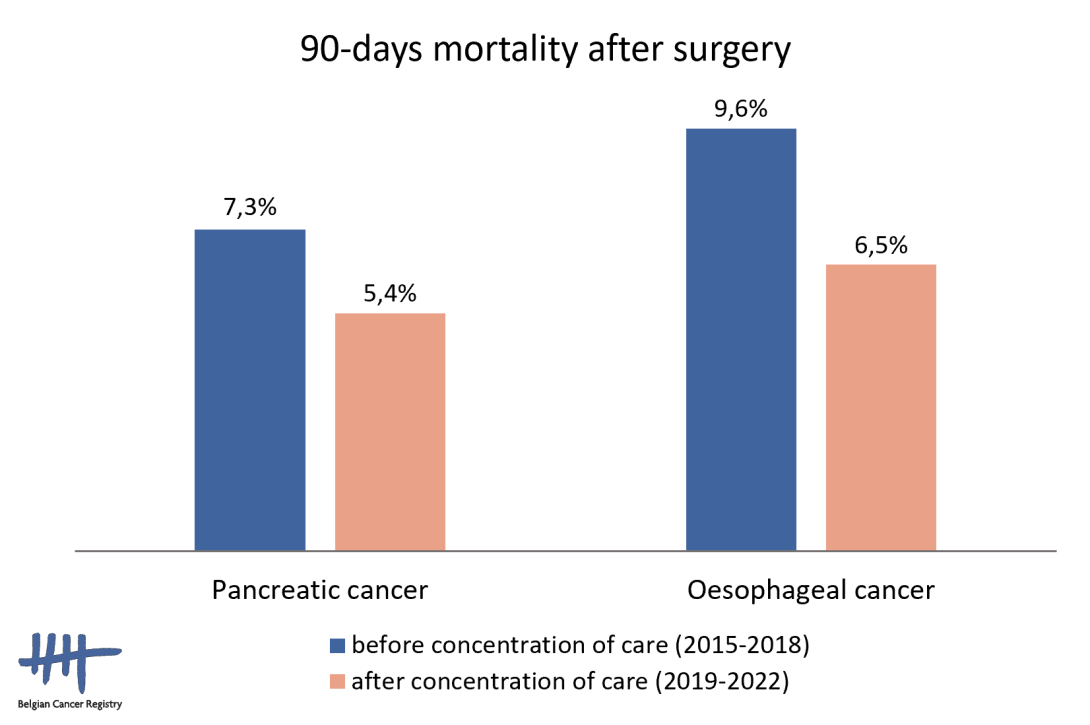
Results after five years of concentrating care show a decline in mortality after complex pancreatic and oesophageal surgery.
Research by the Belgian Cancer Registry (BCR) shows that mortality 90 days after surgery falls as hospitals perform more complex pancreatic or oesophageal surgery. Based on these insights, the NIHDI limited these procedures in 2019 to currently fifteen (pancreas) and eight (oesophagus) reference centres. The quality criteria for complex surgery and reimbursement of the prior multidisciplinary discussion were laid down in an agreement between the NIHDI and the reference centres. Data registration with BCR, which analyses and reports the supplied data, is mandatory.
Analysis of the data shows that in the past five years, 2,626 patients with pancreatic diseases were discussed during a multidisciplinary consultation. Of them, 1,011 patients (38.5%) underwent surgery, including 799 for a malignant tumour. For oesophageal diseases, 1,012 patients were discussed, of whom 401 (39.6%) underwent surgery. 371 of these operations involved a malignant tumour.
There is a clear trend towards minimally invasive surgery - a technique that involves surgery through small incisions, often with a camera and special instruments. Unlike open surgery, this results in less tissue damage, faster recovery and smaller scars. In pancreatic disease, the proportion of open surgery fell from 67.6% to 51.6%, and in oesophageal disease from 41.0% to 27.2% over five years.
The 90-day mortality rate - a key measure of quality of surgery - averaged 4.4% in patients who underwent surgery for pancreatic disease over the five convention years, and 3.4% in the fifth year alone. For oesophageal disease, this was 5.9% and 4.0%, respectively. To examine the impact of concentration of care, 90-day mortality before the concentration (2015-2018) was compared with the first three-and-a-half years after (2019-2022). Differences between patients, such as concomitant conditions and type of surgery, were taken into account. For pancreatic cancer, 90-day mortality decreased significantly from 7.3% to 5.4%. For oesophageal cancer, it also decreased significantly from 9.6% to 6.5%.
The first five years of the agreement brought not only strong clinical results, but also valuable initiatives such as the creation of scientific associations for the centres of expertise: the Belgian Pancreatic Cancer Group (BPCG) and Audit Belgian Esophageal Surgery (ABES). These groups regularly discuss surgical topics, formulate research questions and analyse national results to set up targeted improvement actions, such as reducing complications.
BCR actively supports this concentration of care through data processing and analysis, contributing to better quality of care for cancer patients in Belgium. We look forward to further extending this model to other cancer types where concentration of care can provide clear added value for patients.
Learn more about the specialised centres, the agreement and the results (only available in Dutch or French):
Pancreaschirurgie: terugbetaling in gespecialiseerde centra | RIZIV
Slokdarmchirurgie: terugbetaling in een gespecialiseerd centrum | RIZIV
